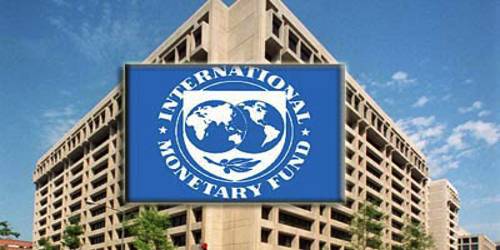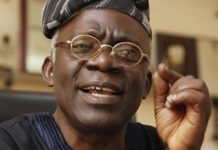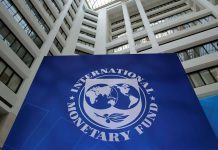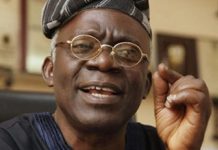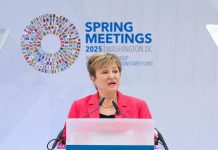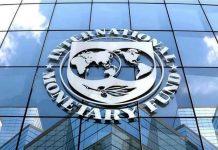Africa Press-Nigeria:
NIGERIA’S economy has been sluggish since oil prices headed south in 2014. Being a crude oil-dependent country, the crude price slump dealt the economy some telling blows. One of the effects of the price crash was the slide of the economy into recession in 2016. Although the country exited recession after five quarters in 2017, the growth since then has been too low to really have any positive impact on the people. While the annual population growth rate has been in the region of 3 per cent, economic growth rate has been around two per cent annually. The slow growth increased hardship in the country and forced many people to fall below the poverty line with Nigeria eventually becoming the country with the highest number of poor people.
As oil prices were heading up following the agreement reached by the Organisation of Petroleum Exporting Countries (OPEC) and OPEC+ to reduce oil production, and Nigeria was making effort to rev its economic growth with a view to improving the lot of its citizens, COVID-19 broke out. The pandemic plummeted the prices of crude oil as factories across the world shut down. Nigeria also went on a lockdown and this had a distressing effect on the economy.
Speaking on the effect of the pandemic on the economy in the first quarter of 2020, Finance Minister, Zainab Ahmed, said “Net oil and gas revenue input to the federation account in the first quarter of 2020 amounted to N940.91 billion. This represents a shortfall of N125.52 billion.
“But with the work that the Economic Sustainability Committee is doing bringing up a stimulus package, we believe that we can reduce the impact of that recession.
“And if we apply all that have been proposed and we are able to implement it we might end up with a recession that is -0.4%. But in any case, we will go into recession but what we are trying to do is to make sure that it is shallow so that we will quickly come out of it come 2021’’
Contraction of the economy remained the pattern in the two subsequent quarters. This informed the decision of President Muhammadu Buhari, during the presentation of the 2021 budget at the National Assembly, to give a hint that the economy was heading for recession, the second in four years.
President Buhari had said, “The resulting global economic recession, low oil prices and heightened global economic uncertainty have had important implications for our economy.
“The Nigerian economy is currently facing serious challenges, with the macroeconomic environment being significantly disrupted by the coronavirus pandemic.
“Real Gross Domestic Product (GDP) growth declined by 6.1 per cent in the second quarter of 2020. This ended the three-year trend of positive, but modest, real GDP growth recorded since the second quarter of 2017.
“I am glad to note that, through our collective efforts, our economy performed relatively better than that of many other developed and emerging economies.
“GDP growth is projected to be negative in the third quarter of this year. As such, our economy may lapse into the second recession in four years, with significant adverse consequences.
“However, we are working assiduously to ensure a rapid recovery in 2021. We remain committed to implementing programmes to lift 100 million Nigerians out of poverty over the next 10 years.”
While the country was still battling to ensure the economy did not remain in the woods for long, #EndSARS protest started. The protest started as an agitation by young Nigerians for an end to police brutality but this morphed into an expansive demand for good governance. The protests unfortunately metamorphosed into civil unrest and violence in some parts of the country following the killing of some of the protesters by some yet to be identified military men.
Tracing the cause of the protest, the International Monetary Fund (IMF) attributed it to the precarious state of the nation’s economy.
According to the Board of the African Department of International Monetary Fund, during the Sub-Saharan Africa (SSA) Regional Economic Outlook briefing last week, the civil unrest was fueled by the low growth prospect of the economy, which the department said had been responsible for the dislocation that exerted pressure on standards of living in the country.
But while looking at the cost of the protest on the economy, the Lagos Chamber of Commerce and Industry (LCCI) put it N700billion within the first 12 days.
The chamber, in a statement signed by its president, Mrs. Toki Mabogunje, said “Over the past twelve days, economic activities have been crippled in most parts of the country, and have been particularly profound in the urban areas. The Nigerian economy has suffered an estimated ?700 billion loss in the past twelve days.”
But that was before the protest took a violent dimension. Following last Tuesday’s attack on the protesters at Lekki tollgate in Lagos, a number of public and private properties were destroyed. The Nigerian Ports Authority headquarters in Marina was set ablaze, the offices of both Television Continental (TVC) and the Nation Newspapers were vandalized, a number of companies were torched, while shops and warehouses were looted. According to Lagos State Commissioner for Information, Gbenga Omotosho, 84 BRT buses were destroyed. Out of the destroyed buses, 27 cost $200,000 each, while 57 of them cost $100,000 each, all totalling about N3.9 billion.
Commenting on the effects of the violence on the economy, the Nigerian Association of Chambers of Commerce, Industry, Mines, and Agriculture (NACCIMA) described the development as a setback for the nation’s economy.
In a statement signed by its President, Hajiya Saratu Aliyu, and titled ‘An urgent call for calm and frank dialogue to end #EndSars crisis and ongoing violence’ NACCIMA noted that its efforts as a “national chamber to help project our country as a favourable and investment friendly destination to our business partners abroad, and other foreign investors over the years is now suffering a serious setback.”
Also commenting, Dr Tunji Akinbobola, CEO of Primus Associates Nigeria, agreed that wooing convincing investors to come to the country might become herculean as a result of the violence that greeted the #EndSARS protests because according to him, “Investors are concerned about the security of their investment which is largely dependent on national security.”
He also noted that the #EndSARS crisis might reverse the progress the country had been making since the economy reopened following the lockdown precipitated by COVID-19 pandemic.
On what to do to save the economy, Akinbobola said the first step should be a de-escalation of violence.
He said, “The government must find a way to put an end to the violence and find a means of engaging the protesters. Until that is done, no concrete steps can be taken towards saving the economy.”
NACCIMA shared the same view. The body sued for calm and called for dialogue between the government and the protesters.
Mr Sam Inebong, a financial analyst, said once an end is put to violence, looting and arson, the process of strengthening the economy to avoid a long lull must take off.
He observed that the effect of COVID-19 pandemic on the economy would have been much more if not that it was mitigated by a number of factors.
According to him, there was a combination of monetary and fiscal policies, which ensured the availability of more funds to the real sector, the free fall of the national currency was halted by the Central Bank of Nigeria (CBN) through a number of interventions, while delinquent loans were restructured to stop them from going bad.
“All of these were responsible for what President Buhari said at the presentation of the 2021 budget to members of the National Assembly that the economy performed relatively better than that of many other developed and emerging economies.
“So, both the fiscal and monetary authorities as well as the corporates have to think out of the box to fashion out strategies to save the economy. If we act fast, we can reverse the losses of the past few days and make the economy work for the people.”
Already, Access Bank has floated a N50 billion interest-free facility for Small and Medium-size Enterprises (SMEs) to mitigate the effects of the #EndSARS crisis on businesses.
The bank, in a statement issued on Saturday, said, “We are announcing that we have set aside a minimum of N50bn (through interest-free loans and grants) to support the rebuilding of businesses and to bring greater opportunities.”
The bank explained that the fund would be used to support “the communities we live in, the people who protect us and the spaces that we need as communities to thrive.”
It added that micro, small and medium sized businesses and young Nigerians would benefit from the fund.
The bank also stated, “We must heal our wounds and come out stronger so that we can occupy our true position in the world and bring a better future for our children.”


